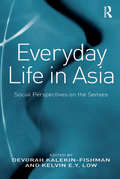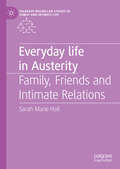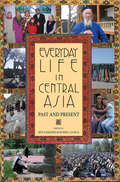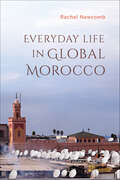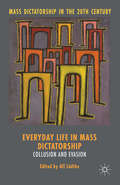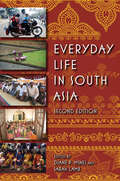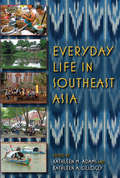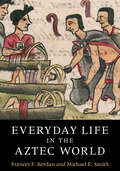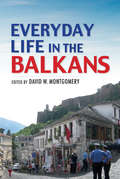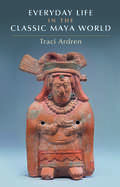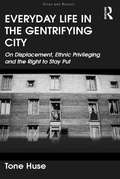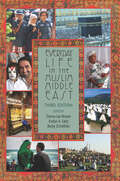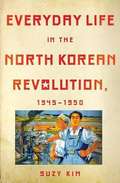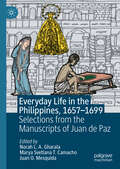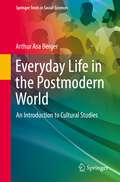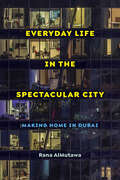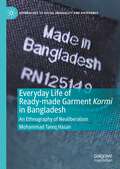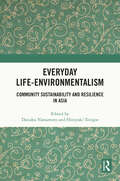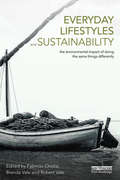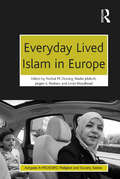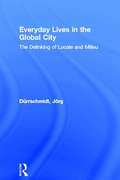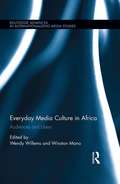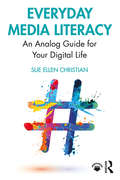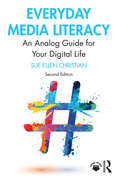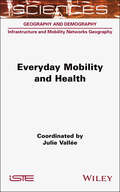- Table View
- List View
Everyday Life in Asia: Social Perspectives on the Senses
by Devorah Kalekin-FishmanEveryday Life in Asia offers a range of detailed case studies which present social perspectives on sensory experiences in Asia. Thematically organized around the notions of the experience of space and place, tradition and the senses, cross-border sensory experiences, and habitus and the senses - its rich empirical content reveals people's commitment to place, and the manner in which its sensory experience provides the key to penetrating the meanings abound in everyday life. Offering the first close analysis of various facets of sensory experience in places that share a geographical location or cultural orientation in Asia, this collection links the conception of place with understandings of 'how the senses work'. With contributions from an international team of experts, Everyday Life in Asia will be of interest to anthropologists, geographers and sociologists with interests in culture, everyday life, and their relation to the senses of place and space.
Everyday Life in Austerity: Family, Friends and Intimate Relations (Palgrave Macmillan Studies in Family and Intimate Life)
by Sarah Marie HallThis book is about the impact of austerity in and on everyday life, based on a two-year ethnography with families and communities in ‘Argleton’, Greater Manchester, UK. Focused on family, friends and intimate relations, and their intersections, the book develops a relational approach to everyday austerity. It reveals how austerity is a deeply personal and social condition, with impacts that spread across and between everyday relationships, spaces and temporal perspectives. It demonstrates how austerity is lived and felt on the ground, with distinctly uneven socio-economic consequences. Furthermore, everyday relationships are subject to change and continuity in times of austerity. Austerity also has lasting impacts on personal and shared experiences, both in terms of day-to-day practices and the lifecourses people imagine themselves living.
Everyday Life in Central Asia: Past and Present
by Jeff Sahadeo and Russell ZancaThis illuminating anthology provides a range of perspectives on daily life across Central Asia and how it has changed in the post-Soviet era.For its citizens, contemporary Central Asia is a land of great promise and peril. While the end of Soviet rule has opened new opportunities for social mobility and cultural expression, political and economic dynamics have also imposed severe hardships. In this lively volume, contributors from a variety of disciplines examine how ordinary Central Asians lead their lives and navigate shifting historical and political trends.Provocative stories of Turkmen nomads, Afghan villagers, Kazakh scientists, Kyrgyz border guards, a Tajik strongman, guardians of religious shrines in Uzbekistan, and other narratives illuminate important issues of gender, religion, power, culture, and wealth. A vibrant and dynamic world of life in urban neighborhoods and small villages, at weddings and celebrations, at classroom tables, and around dinner tables emerges from this introduction to a geopolitically strategic and culturally fascinating region.
Everyday Life in Global Morocco (Public Cultures Of The Middle East And North Africa Ser.)
by Rachel NewcombFollowing the story of one middle class family as they work, eat, love, and grow, Everyday Life in Global Morocco provides a moving and engaging exploration of how world issues impact lives. Rachel Newcomb shows how larger issues like gentrification, changing diets, and nontraditional approaches to marriage and fertility are changing what the everyday looks and feels like in Morocco. Newcomb's close engagement with the Benjelloun family presents a broad range of responses to the multifaceted effects of globalization. The lived experience of the modern family is placed in contrast with the traditional expectation of how this family should operate. This juxtaposition encourages new ways of thinking about how modern the notion of globalization really is.
Everyday Life in Mass Dictatorship: Collusion and Evasion (Mass Dictatorship in the Twentieth Century)
by Alf L�dtkeOppression and violence are often cited as the pivotal aspects of modern dictatorships, but it is the collusion of large majorities that enable these regimes to function. The desire for a better life and a powerful national, if not imperial community provide the basis for the many forms of people's cooperation explored in this volume.
Everyday Life in South Asia, Second Edition
by Sarah E. Lamb Diane P. MinesThis anthology provides a lively and stimulating view of the lives of ordinary citizens in India, Pakistan, Bangladesh, Nepal, and Sri Lanka. For the second edition of this popular textbook, readings have been updated and new essays added. The result is a timely collection that explores key themes in understanding the region, including gender, caste, class, religion, globalization, economic liberalization, nationalism, and emerging modernities. New readings focus attention on the experiences of the middle classes, migrant workers, and IT professionals, and on media, consumerism, and youth culture. Clear and engaged writing makes this text particularly valuable for general and student readers, while the range of new and classic scholarship provides a useful resource for specialists.
Everyday Life in Southeast Asia
by Kathleen A. Gillogly Kathleen M. AdamsThis lively survey of the peoples, cultures, and societies of Southeast Asia introduces a region of tremendous geographic, linguistic, historical, and religious diversity. Encompassing both mainland and island countries, these engaging essays describe personhood and identity, family and household organization, nation-states, religion, popular culture and the arts, the legacies of war and recovery, globalization, and the environment. Throughout, the focus is on the daily lives and experiences of ordinary people. Most of the essays are original to this volume, while a few are widely taught classics. All were chosen for their timeliness and interest, and are ideally suited for the classroom.
Everyday Life in the Aztec World
by Michael E. Smith Frances BerdanIn Daily Life of the Aztecs, Frances Berdan and Michael E. Smith offer a view into the lives of real people, doing very human things, in the unique cultural world of Aztec central Mexico. The first section focuses on people from an array of social classes - the emperor, a priest, a feather worker, a merchant, a farmer, and a slave - who interacted in the economic, social and religious realms of the Aztec world. In the second section, the authors examine four important life events where the lives of these and others intersected: the birth and naming of a child, market day, a day at court, and a battle. Through the microscopic views of individual types of lives, and interweaving of those lives into the broader Aztec world, Berdan and Smith recreate everyday life in the final years of the Aztec Empire.
Everyday Life in the Balkans
by David W. MontgomeryEveryday Life in the Balkans gathers the work of leading scholars across disciplines to provide a broad overview of the countries of Albania, Bosnia and Herzegovina, Bulgaria, Croatia, Greece, Kosovo, Macedonia, Romania, Serbia, and Turkey. This region has long been characterized as a place of instability and political turmoil, from World War I, through the Yugoslav Wars, and even today as debate continues over issues such as the influx of refugees or the expansion of the European Union. However, the work gathered here moves beyond the images of war and post-socialist stagnation which dominate Western media coverage of the region to instead focus on the lived experiences of the people in these countries. Contributors consider a wide range of issues including family dynamics, gay rights, war memory, religion, cinema, fashion, and politics. Using clear language and engaging examples, Everyday Life in the Balkans provides the background context necessary for an enlightened conversation about the policies, economics, and culture of the region.
Everyday Life in the Classic Maya World
by Traci ArdrenEveryday Life in the Classic Maya World introduces readers to a range of people who lived during the Classic period (200–800 CE) of Maya civilization. Traci Ardren here reconstructs the individual experiences of Maya people across all social arenas and experiences, including less-studied populations, such as elders, children, and non-gender binary people. Putting people, rather than objects, at the heart of her narrative, she examines the daily activities of a small rural household of farmers and artists, hunting and bee-keeping rituals, and the bustling activities of the urban marketplace. Ardren bases her study on up-to-date and diverse sources and approaches, including archaeology, art history, epigraphy, and ethnography. Her volume reveals the stories of ancient Maya people and also shows the relevance of those stories today. Written in an engaging style, Everyday Life in the Classic Maya World offers readers at all levels a view into the amazing accomplishments of a culture that continues to fascinate.
Everyday Life in the Gentrifying City: On Displacement, Ethnic Privileging and the Right to Stay Put (Cities and Society)
by Tone HuseBased on ethnographic fieldwork conducted in Oslo, Everyday Life in the Gentrifying City offers an examination of gentrification from below, exploring the effects of this process upon city neighbourhoods and those that inhabit them, whether residents, business owners and their customers, or local activists. Engaging with recent debates surrounding immigration and the inclusion of ethnic minorities in the city, the book takes up the question of ethnicity and gentrification. It argues for an urban policy that gives up the preoccupation with policies concerning the residential mix and place transformation in favour of empowering its citizens. A lively and engaging analysis, in which theoretical rigour is illuminated with rich interviews and empirical content in order to shed light on the relationship between gentrification, displacement, and integration, Everyday Life in the Gentrifying City will appeal to scholars and students of sociology, geography, anthropology and urban studies.
Everyday Life in the Muslim Middle East, Third Edition
by Lila Abu-Lughod Dawn Chatty Marcia C. Inhorn Farha Ghannam Jonathan Holt Shannon Sherine Hamdy Jenny White Susan Slyomovics Melani Cammett Ziba Mir-Hosseini Fida J. Adely Kristin V. Monroe Brian Silverstein Walter Armbrust Samer S. Shehata Andrew Gardner Diane Singerman William O. Beeman Quintan Wiktorowicz Robert R. Bianchi Victoria Fontan Christine El Ouardani Momina Zakzouk Anne H. Betteridge Steven Caton Angel Foster Simon Hawkins Natalie K. Jensen Kristina Nelson Yagmur Nuhrat Marcie Patton Erika Friedl Loeffler Brian K. BarberThe substantially revised and updated third edition of Everyday Life in the Muslim Middle East focuses on the experiences of ordinary men, women, and children from the region. Readers will gain a grassroots appreciation of Middle East life, culture, and society that recognizes the impact of wars and uprisings as well as changes to Islamic practice due to advances in technology. The book also explores the influence of social media on politics and labor relations and the changing status of women, family values, marriage, childrearing, gender, and gay rights. This dynamic and imaginative volume continues to provide a rich resource for understanding contemporary Muslim culture in the Middle East.
Everyday Life in the North Korean Revolution, 1945–1950
by Suzy KimDuring the founding of North Korea, competing visions of an ideal modern state proliferated. Independence and democracy were touted by all, but plans for the future of North Korea differed in their ideas about how everyday life should be organized. Daily life came under scrutiny as the primary arena for social change in public and private life. In Everyday Life in the North Korean Revolution, 1945-1950, Kim examines the revolutionary events that shaped people's lives in the development of the Democratic People's Republic of Korea. By shifting the historical focus from the state and the Great Leader to how villagers experienced social revolution, Kim offers new insights into why North Korea insists on setting its own course.Kim's innovative use of documents seized by U.S. military forces during the Korean War and now stored in the National Archives--personnel files, autobiographies, minutes of organizational meetings, educational materials, women's magazines, and court documents--together with oral histories allows her to present the first social history of North Korea during its formative years. In an account that makes clear the leading role of women in these efforts, Kim examines how villagers experienced, understood, and later remembered such events as the first land reform and modern elections in Korea's history, as well as practices in literacy schools, communal halls, mass organizations, and study sessions that transformed daily routine.
Everyday Life in the Philippines, 1657–1699: Selections from the Manuscripts of Juan de Paz
by Norah L. A. Gharala Marya Svetlana T. Camacho Juan O. MesquidaThis book examines the legacy of one of the most influential members of Spanish society in the seventeenth-century Philippines, Dominican scholar Juan de Paz. Using a unique manuscript from the collections of the Archivo de la Universidad de Santo Tomás in Manila, the authors provide a window into the concerns, problems, and entanglements of people of different ethnicities, occupations, and stations in life. Paz’s writings resolving conflicts and weighing in on questions (consultas) have not previously been translated into English. The transcriptions, translations, and editorial introductions collected in this volume therefore make it an invaluable resource for students and scholars interested in the cultural and social history of the Philippines and the Spanish empire.
Everyday Life in the Postmodern World: An Introduction to Cultural Studies (Springer Texts in Social Sciences)
by Arthur Asa BergerThis introductory textbook familiarizes students with ideas of key thinkers and perspectives related to postmodern thought and everyday life. The book is unique in that it offers selections from key passages of works of important thinkers as well as from some of the author's own publications that serve as examples of how to interpret various aspects of culture. The book draws in readers with its engaging and conversational style and use of cases, illustrations and photographs, including fun discussions on everyday life under pandemic restrictions. This is a must read for students taking courses in sociology, cultural anthropology, culture and media studies, linguistics, social philosophy, and for specific courses on postmodernism.
Everyday Life in the Spectacular City: Making Home in Dubai
by Rana AlMutawaEveryday Life in the Spectacular City is a groundbreaking urban ethnography that reveals how middle-class citizens and longtime residents of Dubai interact with the city's so-called superficial spaces to create meaningful social lives. Rana AlMutawa shows that inhabitants adapt themselves to top-down development projects, from big malls to megaprojects. These structures serve residents' evolving social needs, transforming Dubai's spectacular spaces into personally important cultural sites. These practices are significant because they expand our understanding of agency as not only subversive but also adaptive. Through extensive fieldwork, AlMutawa, herself an Emirati native to Dubai, finds a more nuanced story of belonging. This story does not seek to uncover the "real" city that lies beneath the veneer of the spectacle, but rather to demonstrate that social meanings and forms of belonging take place within the spectacle itself. By offering an alternative to the discourse of authenticity and elucidating the dynamics of ambivalent belonging, AlMutawa belies stereotypes that portray Dubai's developments as alienating and inherently disempowering. Everyday Life in the Spectacular City speaks beyond the Middle East to a globalized phenomenon, for Dubai's spectacles are unexceptional in today's changing world.
Everyday Life of Ready-made Garment Kormi in Bangladesh: An Ethnography of Neoliberalism (Approaches to Social Inequality and Difference)
by Mohammad Tareq HasanThis book portrays the scene where corporate international trade agreements, a new neoliberal state regime, and a growing textile market have contributed to the becoming of a new class of Muslim female workers—who labor in Bangladesh’s apparel export factories under conditions of neoliberal capitalism. The garment kormi—often abstracted by the homogenizing category of the “garment worker”—remain lost in the statistics of development and empowerment or contrarily exploitation. Thereby, focusing on the everyday lives of garment kormi, i.e., workers’ stories than on the collective of garment workers as a category, this book at one front highlights the neoliberal structures of difference and inequality, and on the other reflects on the potential of egalitarianism and change in terms of novel ways of comprising and expressing life-worlds. It shows that the values in life and the structures that govern life, such as contemporary Bangladesh’s neoliberal order, kinship relationality, and religiosity, are co-constitutive, multi-layered, and always on the move, never fixed.
Everyday Life-Environmentalism: Community Sustainability and Resilience in Asia
by Daisaku Yamamoto Hiroyuki TorigoeThis book provides one of the first systematic introductions to the Japanese concept of life-environmentalism, Seikatsu-Kankyo Shugi. This concept emerged in the 1980s as a shared research framework among Japanese social scientists studying the adverse consequences of postwar industrialization on everyday life in communities. Life-environmentalism offers a lens through which the agency of small communities in sustaining their everyday life and living environment can be understood. The book provides an overview of this approach, including intellectual backgrounds and foundational concepts, along with a variety of empirical case studies that examine environmental and sustainability issues in Japan and other parts of Asia. It also includes critical reflections on the approach in light of contemporary sustainability challenges. The empirical topics covered in the book include local community responses to development projects, resource governance, disaster response and recovery, and historical environmental preservation. The chapters are contributed by researchers working at the forefront of the field. It provides only a glimpse into the vast literature that awaits further exploration and engagement in the future. The book is suitable for upper undergraduate students, graduate students, and researchers interested in environmental problems, sustainability and resilience, disaster mitigation and response, and regional development in Asian contexts, particularly Japan. It is well-suited for courses in anthropology, geography, sociology, urban and regional planning, political science, Asian studies, and environmental studies.
Everyday Lifestyles and Sustainability: The Environmental Impact Of Doing The Same Things Differently
by Robert Vale Brenda Vale Fabricio ChiccaThe impact of humanity on the earth overshoots the earth’s bio-capacity to supply humanity’s needs, meaning that people are living off earth’s capital rather than its income. However, not all countries are equal and this book explores why apparently similar patterns of daily living can lead to larger and smaller environmental impacts. The contributors describe daily life in many different places in the world and then calculate the environmental impact of these ways of living from the perspective of ecological and carbon footprints. This leads to comparison and discussion of what living within the limits of the planet might mean. Current footprints for countries are derived from national statistics and these hide the variety of impacts made by individual people and the choices they make in their daily lives. This book takes a ‘bottom-up’ approach by calculating the footprints of daily living. The purpose is to show that small changes in behaviour now could avoid some very challenging problems in the future. Offering a global perspective on the question of sustainable living, this book will be of great interest to anyone with a concern for the future, as well as students and researchers in environmental studies, human geography and development studies.
Everyday Lived Islam in Europe (AHRC/ESRC Religion and Society Series)
by Linda Woodhead Nathal M. Dessing Nadia JeldtoftThis book offers a new direction for the study of contemporary Islam by focusing on what being Muslim means in people’s everyday lives. It complements existing studies by focusing not on mosque-going, activist Muslims, but on how people live out their faith in schools, workplaces and homes, and in dealing with problems of health, wellbeing and relationships. As well as offering fresh empirical studies of everyday lived Islam, the book offers a new approach which calls for the study of ’official’ religion and everyday ’tactical’ religion in relation to one another. It discusses what this involves, the methods it requires, and how it relates to existing work in Islamic Studies.
Everyday Lives in the Global City: The Delinking of Locale and Milieu
by Jörg DürrschmidtRejecting simplifying notions of globalisation as a macro-economic force, this book provides a grounded picture of the various ways in which people's biographies are tied up with the global cultural economy. The main argument of the book is that the globalisation of lives is experienced by people as the 'extension' of their 'milieux' both spatially and symbolically.
Everyday Media Culture in Africa: Audiences and Users (Routledge Advances in Internationalizing Media Studies)
by Wendy Willems Winston ManoAfrican audiences and users are rapidly gaining in importance and increasingly targeted by global media companies, social media platforms and mobile phone operators. This is the first edited volume that addresses the everyday lived experiences of Africans in their interaction with different kinds of media: old and new, state and private, elite and popular, global and national, material and virtual. So far, the bulk of academic research on media and communication in Africa has studied media through the lens of media-state relations, thereby adopting liberal democracy as the normative ideal and examining the potential contribution of African media to development and democratization. Focusing instead on everyday media culture in a range of African countries, this volume contributes to the broader project of provincializing and decolonizing audience and internet studies.
Everyday Media Literacy: An Analog Guide for Your Digital Life
by Sue Ellen ChristianIn this graphic guide to media literacy, award-winning educator Sue Ellen Christian offers students an accessible, informed and lively look at how they can consume and create media intentionally and critically. The straight-talking textbook offers timely examples and relevant activities to equip students with the skills and knowledge they need to assess all media, including news and information. Through discussion prompts, writing exercises, key terms, online links and even origami, readers are provided with a framework from which to critically consume and create media in their everyday lives. Chapters examine news literacy, online activism, digital inequality, privacy, social media and identity, global media corporations and beyond, giving readers a nuanced understanding of the key concepts and concerns at the core of media literacy. Concise, creative and curated, this book highlights the cultural, political and economic dynamics of media in our contemporary society, and how consumers can mindfully navigate their daily media use. Everyday Media Literacy is perfect for students (and educators) of media literacy, journalism, education and media effects looking to build their understanding in an engaging way.
Everyday Media Literacy: An Analog Guide for Your Digital Life
by Sue Ellen ChristianIn this second edition, award-winning educator Sue Ellen Christian offers students an accessible and informed guide to how they can consume and create media intentionally and critically. The textbook applies media literacy principles and critical thinking to the key issues facing young adults today, from analyzing and creating media messages to verifying information and understanding online privacy. Through discussion prompts, writing exercises, key terms, and links, readers are provided with a framework from which to critically consume and create media in their everyday lives. This new edition includes updates covering privacy aspects of AI, VR and the metaverse, and a new chapter on digital audiences, gaming, and the creative and often unpaid labor of social media and influencers. Chapters examine news literacy, online activism, digital inequality, social media and identity, and global media corporations, giving readers a nuanced understanding of the key concepts at the core of media literacy. Concise, creative, and curated, this book highlights the cultural, political, and economic dynamics of media in contemporary society, and how consumers can mindfully navigate their daily media use. This textbook is perfect for students and educators of media literacy, journalism, and education looking to build their understanding in an engaging way.
Everyday Mobility and Health (ISTE Consignment)
by Julie ValléeEveryday mobility is neither favorable nor unfavorable to health. While it can facilitate social interactions, increase access to remote services, or encourage physical activity, it can also generate pollution, promote the spread of epidemics or cause traffic accidents. This book presents different facets of the relationship between daily mobility and health, focusing on the environments (geographical, social and political) that people live and move around in. It analyzes the role of mobility in the mechanisms of environmental exposure and diffusion, as well as the resulting health inequalities. It deals with active modes of travel (mainly walking and cycling) and the local contexts that are conducive to them. Finally, it offers a critical reading of the place given to everyday mobility in policies to combat obesity and rationalize regional healthcare provision.
